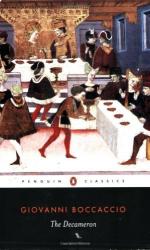|
This section contains 5,174 words (approx. 18 pages at 300 words per page) |

|
SOURCE: De Sanctis, Francesco. “Boccaccio's Human Comedy.” In Critical Perspectives on the “Decameron,” translated by Joan Redfern, edited by Robert S. Dombroski, pp. 26-37. London: Hodder and Stoughton, 1976.
In the following excerpt from an essay written in 1871, De Sanctis celebrates Boccaccio's earthy comedy, contrasting it with the high seriousness of the works of Dante and Petrarch.
Boccaccio is not a superior soul, a writer who looks at society from a lofty height, sees the good and bad in it, exposes it impartially, and is perfectly conscious of it all; he is an artist who feels himself one with the society in which he lives, and he writes with that sort of semi-consciousness of men who are swayed by the shifting impressions of life without stopping to analyse them. And this is really the quality that divides him substantially from the ecstatic Dante and the ecstatic Petrarch. Boccaccio is...
|
This section contains 5,174 words (approx. 18 pages at 300 words per page) |

|


